Wandering through the grocery store aisles, it’s like navigating a minefield when your doc’s on your case about bringing down those cholesterol numbers. They tell ya, “eat this, not that,” but sometimes, it feels like you need a degree in nutrition to make heads or tails of it. Well, fear not, because we’ve got the lowdown on the top ten troublemakers that might be sneaking their way into your pantry and doing a number on your heart health.
Let’s cut to the chase; high cholesterol is not something to mess with. It’s like having an unwanted guest clogging up the blood highways in your body, leading to a whole mess of problems. From bacon that’s making your breakfast a risky business to those sneaky fried foods that are more treacherous than they’re worth, it’s high time we unveiled the culprits. Buckle up as we dive into what foods to push off your plate to keep those arteries smooth and your ticker ticking right.

Understanding the Risks
Now, talking about cholesterol is not just about avoiding this or chomping down on that. It’s a shadow lurking in your blood, waiting to pounce on your heart and blood flow. Keeping those numbers in check isn’t just for kicks; it’s a bona fide life-saver. When unhealthy cholesterol levels start throwing parties on your artery walls, it’s bad news for your blood flow and your poor heart. Imagine trying to push a river through a clogged pipe – it doesn’t end well.
Why Is High Cholesterol Dangerous?
High cholesterol is the ninja of health problems – silent but deadly, sneaking up and plopping itself in your blood vessels. These unwanted squatters can lead to the dreaded chest pain or, worse, set the stage for a heart attack or stroke. It’s all fun and games until your arteries start throwing up roadblocks to your blood flow, and trust me, nobody wants to deal with that mess. Keeping those cholesterol levels in the safe zone is like having a good insurance policy for your ticker.
The Role of Diet in Managing Cholesterol Levels
Let’s cut through the noise – when it comes to knocking down high cholesterol, what you shove on your plate plays front and center. Steering clear of dietary cholesterol, especially the kind lurking in animal-based goodies, is key. Imagine your body as a fancy car; you wouldn’t fill it with the wrong fuel on purpose, right? It’s the same deal here. Choosing the right grub – think green and lean – keeps the engine running smooth without gumming up the works with bad cholesterol.
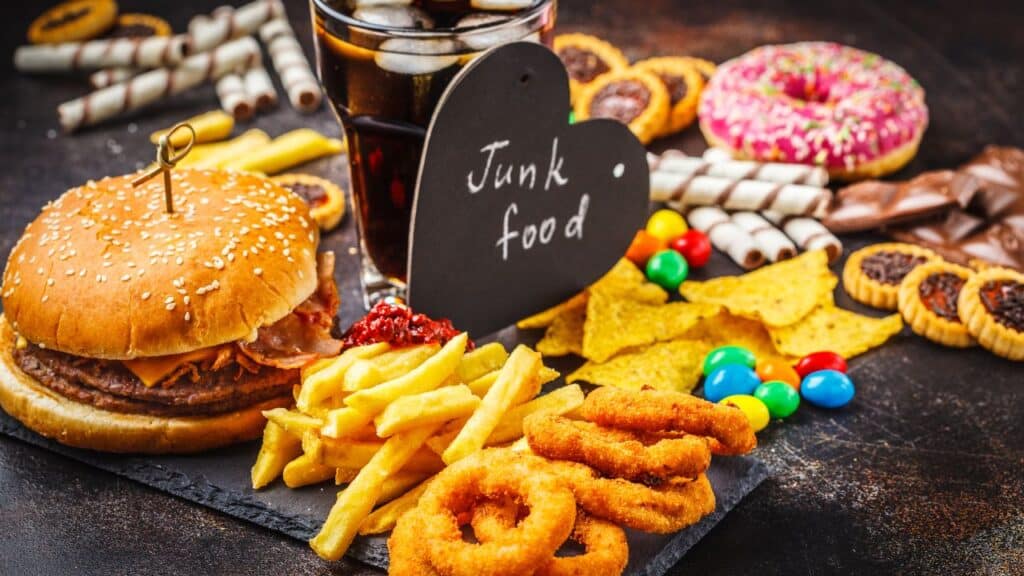
The Offenders: What to Avoid for Better Health
Ready for the rogues’ gallery of foods? Brace yourselves. Topping the “most wanted” list for wrecking heart health is the dastardly duo of “bad” cholesterol and its partner in crime, saturated fats. These villains love to throw a wrench in the works, leading to a rap sheet that includes heart disease and a bunch of other health nuisances. But don’t fret; knowledge is power, and we’re about to shine a light on these sneaky dietary saboteurs.
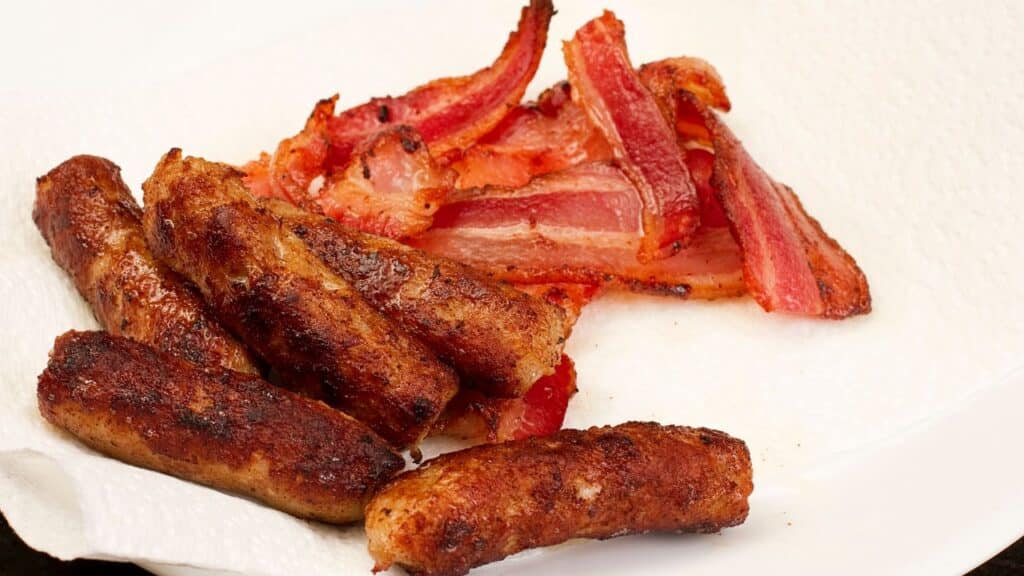
1. Processed Meats: A Hidden Source of Saturated Fats
Folks, let’s talk processed meats. We’re looking at you, bacon, sausage, and those deli slices that make sandwiches a snap. These guys are like the undercover agents of the saturated fat world, sneaking into your diet and plotting mischief against your cholesterol levels.
Examples: Bacon, Sausage, and Deli Slices
Cutting back on that beloved bacon and opting for chicken or turkey breast could be a game-changer. Reducing saturated fat intake doesn’t mean farewell to flavor. It’s about making smarter choices that don’t turn your blood vessels into a no-go zone.
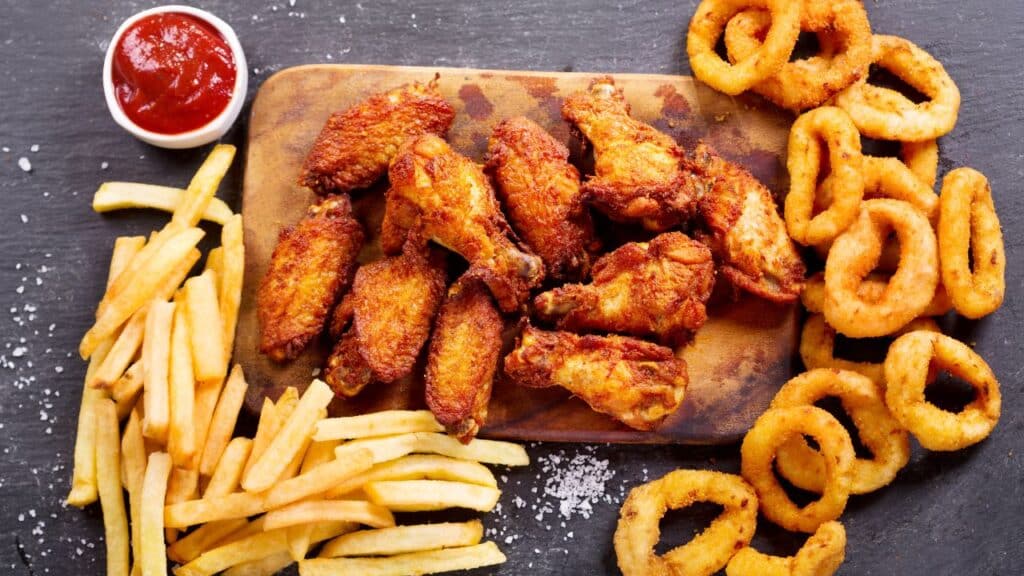
2. Fried Foods: Delicious but Dangerous
Let’s face it, the crunch of fried foods has a way of speaking directly to the soul. But here’s the kicker: indulging in fried foods can bump up the increased risk of heart disease and play havoc with the numbers on your calorie count. It’s a classic case of forbidden love.
Impact on Cholesterol: Why You Should Think Twice

3. Baked Goods: The Sweet Temptation
Sweet, sweet temptation comes in the form of baked goods, whispering, “Eat me,” as they plot against your heart health. Packed with butter and shortening, they’re no friends to your arteries.
Trans Fats and Saturated Fats in Your Favorite Treats
Trading in those butter-laden baked goods for options rich in olive oil or canola oil can spell the difference. These oils bring the good kind of fats to the party – polyunsaturated fats – turning the tables on unhealthy blood cholesterol levels.
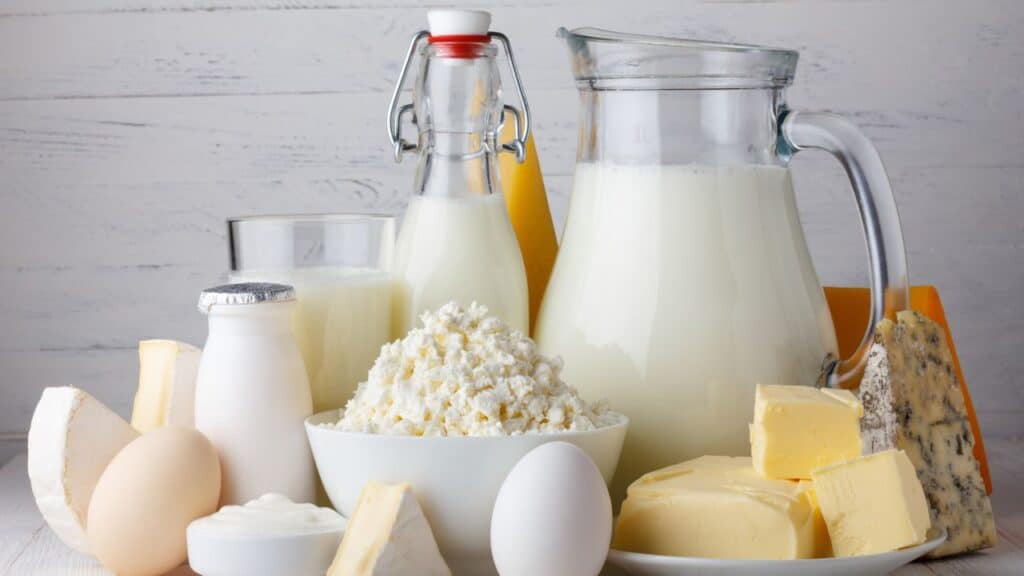
4. Full-Fat Dairy Products: Not All Yogurt Is Created Equal
When it comes to dairy, going whole is not the whole story. Full-fat dairy, including beloved ice cream, is swimming in saturated fats. These fats cozy up to “bad” cholesterol, whispering sweet nothings that elevate LDL cholesterol levels.
Choosing Healthier Alternatives: Low-Fat Options
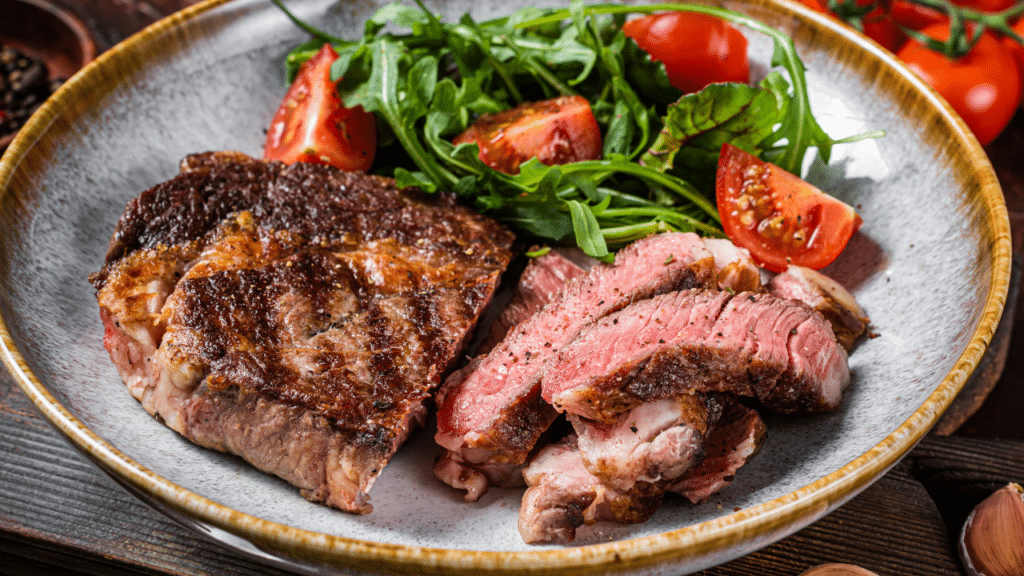
5. High-Fat Meats: T-Bone Steak and Beyond
Steaks might be the king of grills, but when it comes to your heart, it’s better to opt for the leaner cuts. Trading in that T-bone for something a bit more on the lean side can help keep your meat consumption in the eating healthy zone without sacrificing taste.
The Saturated Fat Content and Healthier Protein Sources
Choosing protein sources with a lower saturated fat content, like opting for lean cuts over fattier options, can help maintain heart health. Including full-fat dairy wisely and keeping an eye on LDL cholesterol levels ensures you’re not just eating well, but smart.
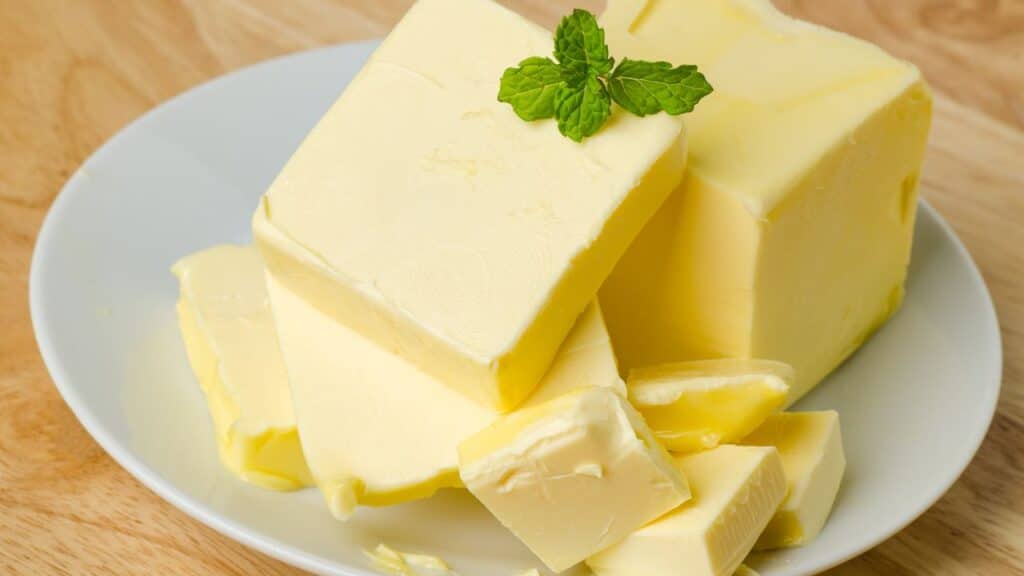
6. Butter: A Staple with Hidden Risks
Butter might sneak onto your toast every morning, but watch out, it’s rich in saturated fats. Just one tablespoon packs a whopping 7 grams of it. Switching up unhealthy fats with smarter choices like olive oil or avocado ain’t just fancy talk; it’s a game changer for knocking down those LDL levels. Now, who would’ve thought that the creamy delight hiding in your fridge door could be nudging your cholesterol the wrong way?
Understanding the Impact on Your Arteries
Slick as it seems sliding over corn or melting into a hot pan, butter’s aftermath on arteries ain’t pretty. That saturated fat we’re palling up with at the breakfast table? It’s cozying up inside arteries, laying down the groundwork for some serious blockage. Think of it as a houseguest overstaying their welcome, but instead of taking up space on your couch, they’re camping out in your heart’s highways.
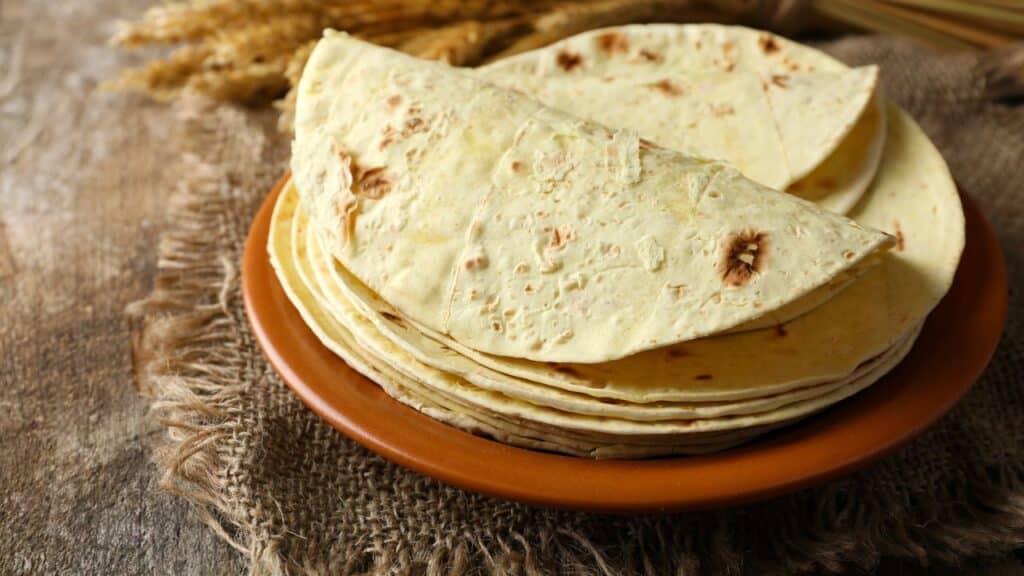
7. Flour Tortillas: The Surprising Source of Trans Fats
Roll it, wrap it, we love a good flour tortilla for everything from burritos to wraps. But hold up, because these flat favorites hide a secret: trans fats. And if we learned anything, it’s that trans fats are no amigos to our blood cholesterol. Blame it on palm oil or its kernel cousin used in making these tortillas; they’re pushing our cholesterol in the wrong direction.
Healthier Wrapping Options: Whole Wheat and Corn Tortillas
So, how do we keep our wraps without the worry? Easy switch to whole wheat or corn tortillas. Besides dodging the trans fat bullet, you’re also giving a high-five to more fiber. And in the mighty match against cholesterol, consider fiber your heavyweight champ — ready to knock out those LDLs, one wrap at a time.
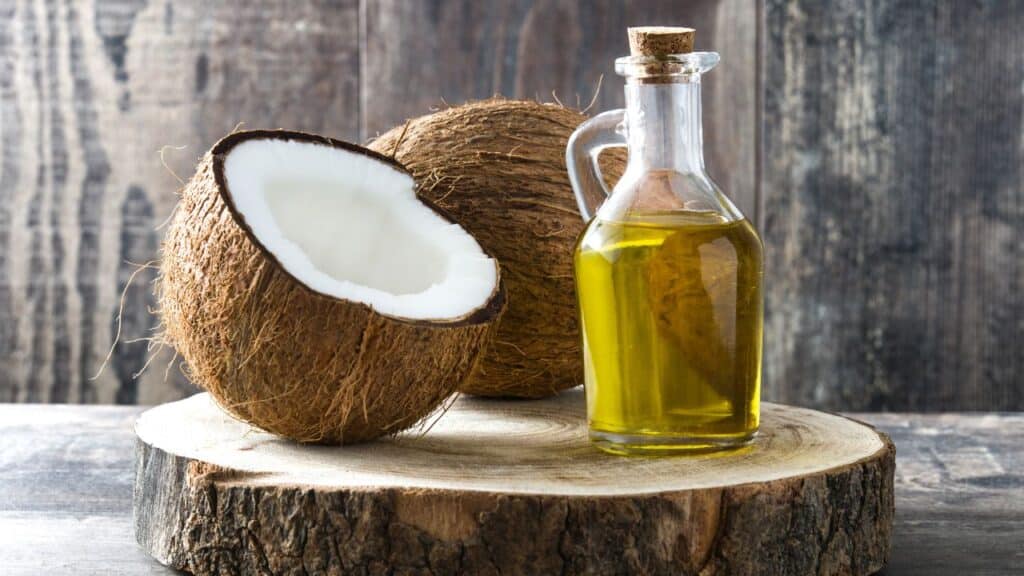
8. Coconut Oil: The Controversial Fat
Coconut oil has been the belle of the ball; good for frying your eggs, creaming your coffee, and even as a hair mask. But when it comes to cholesterol, it might not be your heart’s best friend. Packed with saturated fat, coconut oil sends LDL levels on a hike. Yup, that means those bad cholesterol numbers go up, not the direction we’re aiming for folks.
The Debate on Heart Health Impact
The coconut oil convo is as slippery as the oil itself. Some swear by its health halo, but science hands us the umbrella. Studies point out that swapping coconut oil for vegetable oils, those low in saturated fat, could put a leash on that rising LDL. Remember, it’s not about banning the jar, but maybe not giving it a free pass to every meal.

9. Sugar-Sweetened Beverages: Liquid Culprits
Oh, the sweet siren call of sugary drinks; so tempting and yet, so treacherous for our cholesterol. Gulping down these liquid culprits like soda or sweet teas play a fast one on our lipid profiles, pushing up the cholesterol and triglycerides. It’s a sneaky way our treats mess with our heart’s health without us even realizing.
How Sugary Drinks Contribute to Cholesterol Problems
When we toss back sugar-sweetened beverages, we’re not just quenching thirst. We’re giving high cholesterol levels a green light. That sugar getting cozy in our bloodstream? It’s not just hanging out; it’s busy at work converting into the kind of fat that clogs arteries and whispers sweet nothings to our LDL levels, convincing them to climb higher.

10. Fast Food: Convenience at a Cost
Fast food: it’s the speed date of the dining world, quick and easy but maybe not so healthy. High on the charts for convenience but, sadly, also scoring high for boosting cholesterol. Those grab-and-go meals are often packed with saturated fats and trans fats, the dynamic duo of cholesterol chaos.
The Overall Impact on Health Beyond Cholesterol
But it’s not just about cholesterol. Diving into fast food regularly is like investing in a portfolio heavy on risks – with dividends paid in higher blood pressure, belly fat, and inflammation. Plus, it messes with blood sugar regulation. It’s a package deal where the health costs may just outweigh the convenience.

Making Healthier Choices
Making smarter food choices is like picking the right tools for a job. Navigate the grocery store aisles with a plan. Aim for the fresh produce section, lean meats, and whole grains. Consider it a treasure hunt for heart health, where every good choice adds up to a win against high cholesterol.
Navigating the Grocery Store for Heart Health
Walking into the grocery store can feel like stepping into a labyrinth. But here’s a pro tip: stick to the edges. That’s where you’ll find the fresh fruits, veggies, and meats. Dodge the siren song of processed foods in the middle aisles. Your heart (and your waistline) will thank you.
Substitutes and Alternatives to High-Cholesterol Foods
Subbing out high-cholesterol foods doesn’t have to mean kissing flavor goodbye. Swap in avocado for butter, go for lean cuts of meat, and choose olive oil over palm. And let’s hear it for omega-3 fatty acids, those heart-healthy heroes found in fish and flaxseed. They’re like the secret agents of fats, working undercover to protect your heart.

Beyond Diet: A Holistic Approach to Lowering Cholesterol
Lowering cholesterol isn’t just about swapping steak for salads. It’s a whole lifestyle gig. Fresh fruits, veggies, whole grains, and that omega-rich fish and lean meat are your baseline. Add regular exercise, cut down on stress, and keep the smoking at bay. It’s about building a life where good cholesterol levels naturally follow.
Lifestyle Changes for Long-Term Wellness
Changing up your lifestyle for better cholesterol isn’t a sprint; it’s more like a marathon. Small changes, like choosing stairs over elevators, adding a side salad instead of fries, or taking up a stress-busting hobby, can add up. It’s all about the long game – steering your health in the right direction, bit by bit, day by day.
Monitoring Your Progress: The Importance of Regular Check-Ups
Keeping an eye on how well you’re managing your cholesterol isn’t just smart; it’s critical. Think of it like keeping tabs on a sneaky cat—turn your back for too long, and trouble’s afoot. Regular check-ups are the GPS tracker for your health journey, pinpointing your location and how far you’ve got to go to reach your destination of lower cholesterol levels. These check-ups usually involve a chat with the doc and a blood test, which is like peeking under the hood to see how the engine’s doing.
Blood tests are your best bud in the fight against high cholesterol. They tell you clear as day whether your dietary changes and lifestyle adjustments are winning the battle or if it’s time to call in reinforcements. These tests measure the levels of LDL (“bad” cholesterol), HDL (“good” cholesterol), and triglycerides in your bloodstream, giving you and your healthcare professional a detailed map of where your health stands and where it’s heading.
So, making time for these health check-ups and blood tests isn’t just a good idea—it’s essential. They help ensure that all the hard work you’re putting in to manage your cholesterol actually pays off. Plus, catching any hiccups early means you can adjust your game plan before minor issues turn into major problems. All in all, staying on top of your check-ups is like keeping your health on a steady cruise control.

Conclusion: Empowering Yourself Against High Cholesterol
Tackling the top ten worst foods for high cholesterol is like navigating a minefield in your daily diet, but it’s a battle well worth engaging in. Remember, this ain’t just about dodging those heart attacks or strokes; it’s about rewriting the script of your life to star a healthier, more vibrant you. While clinical trials and the smart folks in lab coats are continuously working to understand the best cholesterol-lowering medications and strategies, the power to change lies with you. Avoid those ten worst foods for high cholesterol like they’re your nosy neighbors, and embrace the substitutes that not only taste good but are good for your ticker too.
Let’s not forget, blood tests are your sneak peek into how well you’re doing in this fight against high cholesterol. They’re like the quarterly reports for your body, letting you know if you’re on track or if it’s time to switch things up. Regular check-ups with your doc can help catch any upticks in cholesterol levels early, so you can adjust your diet or medication as needed. It’s about staying one step ahead of cardiovascular diseases and keeping the risk of heart disease and stroke in the rearview mirror.
So, there you have it. Steering clear of those culprits on the list of the top ten worst foods for high cholesterol is a significant stride toward heart health, but remember, it’s not the only step. A balanced diet, regular exercise, and keeping an eye on your progress through blood tests and doctor visits are the cornerstones of ensuring your heart keeps beating strong. Empower yourself by making those health-conscious choices; your heart will thank you for years to come.

